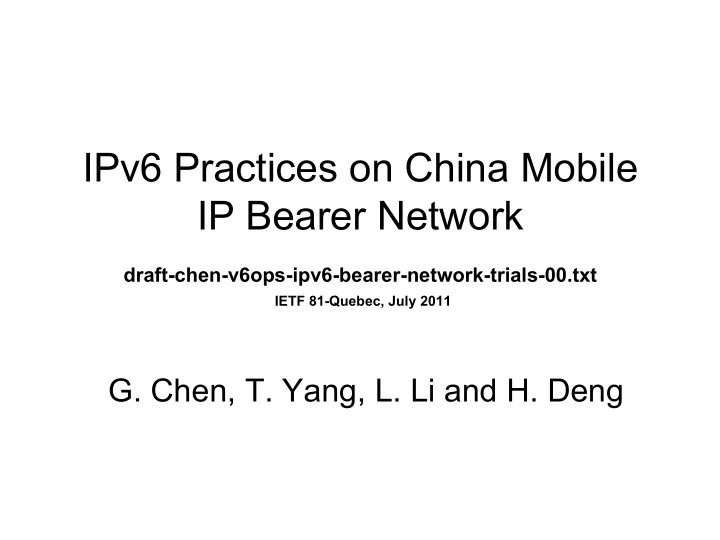

IPv6 Practices on China Mobile IP Bearer Network draft-chen-v6ops-ipv6-bearer-network-trials-00.txt IETF 81-Quebec, July 2011 G. Chen, T. Yang, L. Li and H. Deng
Background • China Mobile IPv6 trial program started over 3 years ago • This presentation is mainly focusing on IP bearer network infrastructure for incremental IPv6 deployment – IPv6 testing on routers was undertaken in our lab before the pre- commercial trials, where there were 7 vendors involved and six months lasted – With incremental extension, support for IPv6 access network (both mobile and fixed access network) and IPv6 service could be introduced • Trials for IP bearer announced in June 2011, and BRAS will be announced later
Testing Methodology on IP bearer network trials • The trial was taken place on IP backbone hierarchical IP bearer network routers • Two router testers generate routing information and inject into the under-testing network • Test cases IP core routers – IPv6 routing protocol : BGP4+, OSPFv3 and ISIS – Dual-stack routing protocol IP access – Tunnel protocol: 6PE/6vPE routers and configured 6in4 tunnel – IPv6 ACL, policy routing Tester Tester capabilities and IPsec supporting – IPv6 routing MIB
Testing results and observations Items Results Observations OSPFv3 can't establish adjacencies due to The unified MTU configuration OSPFv3 inconsistent IPv6 MTU is recommended between neighboring routers IPv6 routing MT Routing in IS-IS is protocol ISIS OK recommended to be enable or testing disable simultaneously BGP4+ can’t support AS routing loop error processes BGP4+ OK due to private implementations Routing paths have been computed by IPv4 and IPv6 Dual-stack routing protocol OK routing algorithm independently
Testing results and observations (Cont.) Items Results Observations The caution has been raised by MTU configuration since 6PE/6vPE OK intermediate routers would drop big package Tunneling surpassing network MTU protocol Routers are failed to support 6PE/6vPE are Configured encapsulation package recommended when MPLS 6in4 tunnel going through MPLS is widely enable. network IPsec capabilities is missing It ‘s expected to be in most routers supported along with IPv6 IPsec supporting deployment IPv6 MIBs supporting varied Private MIB have appeared Routing MIB supporting significantly from vendor to to be difficult to build an vendor integrated OAM platform
Testing Methodology on BRAS Case1: BRAS standalone testing BRAS DUT A - Basic IPv6 protocols supporting - Performance testing B RouterTester BRAS(IPv4) Case2: BRAS networking testing - L2TP tunnel - Subscriber profile management L2TP BRAS(IPv4/iPv6)
Testing results and observations Items Results Observations 1) Operator has to build 1) Can’t integrate DHCPv6 separate DHCPv6 server; 2) functionalities; 2) Can’t support IPv6 protocol multicast-based services are MLD and PIM/SM hardly developed Standalone 1) IPv6 FIB capacity is only With IPv6 data packages are testing 10% of its IPv4 FIB capacity; increasing, it is expected that Performance 2) Line card throughput is performance should be testing much less than the nominal upgraded values when data packages length shorter than 128B 1) IPv6CP signaling is not 1) BRAS can’t support IPv6 supported in the case of address delivery through L2TP tunnel deployed; 2) L2TP tunnel; 2) BRAS can’t operator can’t carry out L2TP networking testing distinguish IP flow in term of custom charging policy based IPv4/IPv6 traffic on different IP families characters
Summary • In general, the tests on several aspects indicate that the network has basically qualified for IPv6 operations • The community should pay more attentions to increase IPv6 supporting maturity. IPv6 normative features becoming stable & scalable will take more time than you expected • Operators still need to accumulate experiences on IPv6 network configuration and provisioning during the transition period Comments are welcomed!
Recommend
More recommend